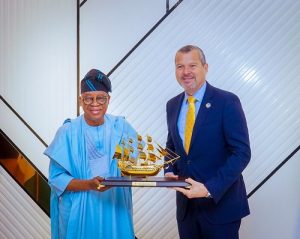IMO Secretary-General Calls for Wider Adoption of Ship Recycling Convention
*As IMO members urged to reduce shipping’s black carbon emissions
WMN.. Ten years after the adoption of the IMO’s Hong Kong Convention (HKC), there has been progress with voluntary application of its requirements but the treaty needs to enter into force in order to be widely implemented, according to IMO.
Speaking at the International seminar on ship recycling: Towards the early entry into force of the Hong Kong Convention held in London on May 10, Kitack Lim, IMO Secretary-General, said:
“I urge member states who have not yet done so to ratify the convention at the earliest opportunity, in order to bring it into force as soon as possible.”
Speakers from industry and national authorities, including ship recycling countries, have been addressing the seminar, which aimed to highlight how to promote sustainable ship recycling and discuss what is necessary to move forward for the early entry into force of the HKC.
The HKC covers the design, construction, operation and maintenance of ships, and preparation for ship recycling in order to facilitate safe and environmentally sound recycling, without compromising the safety and operational efficiency of ships. Under the treaty, ships are required to carry an inventory of hazardous materials, specific to each ship. Ship recycling yards are required to provide a ship recycling plan, specific to each individual ship to be recycled, specifying the manner in which each ship will be recycled, depending on its particulars and its inventory.
Secretary-General Lim highlighted the work already done by IMO to develop guidelines to assist in implementation. In particular, the ongoing project on Safe and Environmentally Sound Ship Recycling in Bangladesh (SENSREC), funded by the Government of Norway and jointly implemented by IMO, the Government of Bangladesh and the Secretariat of the Basel, Rotterdam and Stockholm Conventions (BRS), is in its second phase, focusing on building the country’s institutional capacity and implementing the training materials based on Phase I. Meanwhile, the Government of Japan has been working with relevant stakeholders to improve ship recycling in South Asia.
To date, the convention has been ratified or acceded by eleven states: Belgium, Republic of the Congo, Denmark, Estonia, France, Japan, the Netherlands, Norway, Panama, Serbia and Turkey.
The combined merchant fleets of these eleven states constitute 23% of the gross tonnage of the world’s merchant fleet and their combined ship recycling volume constitutes about 1.6 million gross tonnage.
Entry into force requires 15 states, 40% of the world’s merchant fleet and their ship recycling volume constituting not less than 3% of the gross tonnage of these contracting states’ merchant fleet, reports World Maritime News.
Meanwhile, the Clean Arctic Alliance (CAA) has called on IMO member states to reduce the impact of black carbon emissions from international shipping on the Arctic environment.
The non-governmental organization pointed to the issue as the IMO gathers in London for a meeting of its Marine Environmental Protection Committee (MEPC74).
A number of issues, including black carbon emissions and heavy fuel oil (HFO) in the Arctic will feature on the MEPC74 agenda from May 13-17.
The Clean Arctic Alliance says emissions of black carbon particles by ships burning heavy fuel oil have a dramatic climate warming effect – black carbon is a potent short-lived climate forcer that remains in the atmosphere for only a few days to weeks. But when black carbon is emitted from ships burning heavy fuel in or near Arctic waters, particles fall on ice or snow, reducing its albedo (reflectivity) and causing it to absorb more heat, thus accelerating the warming of the Arctic region. As well as the second leading cause of global warming, black carbon emissions are also harmful to human health.
“By cutting ship-sourced emissions of black carbon, IMO member states could take a quick and effective path to countering the current climate crisis, and minimize further impacts on the Arctic,”said Sian Prior, Lead Advisor to the Clean Arctic Alliance.
“We’re calling on IMO member states to champion a move away from using heavy fuel oils – shipping’s number one source of black carbon – in Arctic waters. With cleaner shipping fuels already available and innovation and ambition driving the global shipping industry towards lower emissions, IMO member states must move rapidly towards zero emission solutions.”
“All eight Arctic countries made a commitment to demonstrate leadership on black carbon in 2015 – and it now seems that all except Canada are backing a move away from heavy fuel oil in the Arctic. As recent comments from Russia’s President Putin and Finland’s President Niinistö demonstrate, the political will for a HFO Free Arctic exists – now it is the time for IMO Member States to turn this will into action, by moving urgently to reduce black carbon emissions and by backing the ban on the use and carriage of HFO in the Arctic, currently under development.”
At MEPC 72 in April 2018, a strongly-worded proposal to ban HFO as shipping fuel from Arctic waters was co-sponsored by Finland, Germany, Iceland, Netherlands, New Zealand, Norway, Sweden and the US. The ban is currently being developed within the IMO.
CAA also reiterated a warning by UN’s Intergovernmental Panel on Climate Change, which warned that we have 12 years to limit a climate change catastrophe. Recent reports suggest that Greenland’s ice sheet is endangered, with about half of the nearly 5,000 gigatons of water lost from the ice sheet since 1927 occurring in 8 years between 2010 and 2018, reports World Maritime News.





